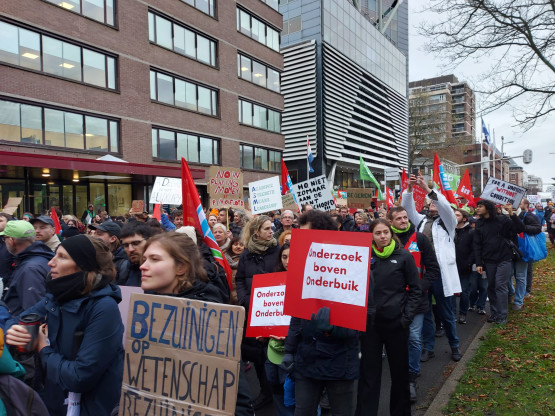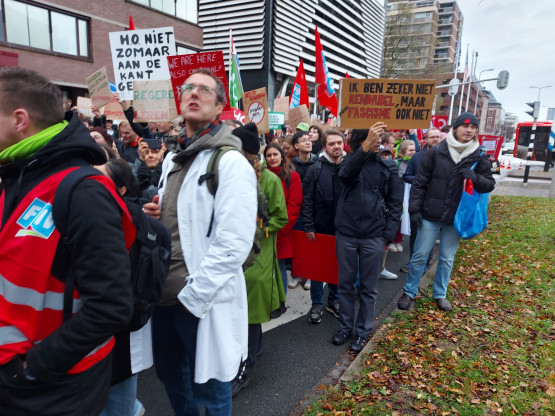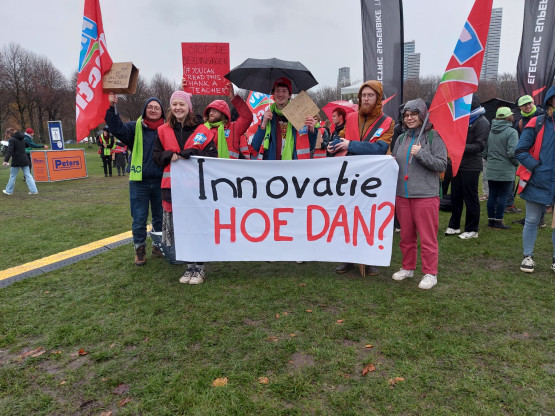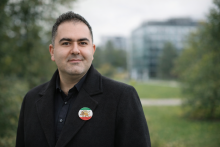Some 15-20 thousand students, teachers, researchers, administrators and politicians demonstrated on The Hague's Malieveld against the cuts to education and research. Read the report on the protest below (in Dutch, translation will follow ASAP). With that, we close this liveblog.

The buses are on their way back to Twente, the academic equivalent of 'Bella Ciao' is still echoing in everyone’s ears. Thousands of demonstrators braved rain and wind to make a fist against this government's billion-dollar cuts in higher education. What the effect is, that remains to be seen. The House of Representatives will debate the intended cuts tomorrow. To be continued...
While next to them a UT protester has fallen asleep with a sign in hand, Wander Nauta and Coen Hackmann look back. 'Nice to see that so many people have a heart for this issue. Should another protest be necessary, I hope that even more people from the universities will make ourselves heard.' According to Nauta, this protest should be enough to get the cuts off the table. 'We have sent a clear signal. I honestly did not expect such a large turnout.'



The protest march en route to the Ministry of OCW.
The march towards the Ministry of OCW has begun. Meanwhile, political relations in The Hague are also becoming increasingly clear: a left-wing bloc wants all cuts off the table. The chances of the cabinet going along with this seem very slim.
Caspar van den Berg, chair of the umbrella organization Universities of the Netherlands, addresses the scale of the cutbacks. 'Cutting back one billion is the same as closing three universities. So much has never been cut back on research and education. Cabinet, is this what you want?' 'Don't do it! Don't do it!', it sounds on the Malieveld.
Then the floor is given to a few politicians. If it is up to Frans Timmermans (GL-PvdA), the cuts are taken off the table and taxes will be raised for those who can bear it. Rob Jetten (D66) argues for an investment of 2 billion euros in education. The big absentee: Minister Eppo Bruins himself. He is said to be in Brussels.

Not only the AOb, but also WOinActie believes that Minister Bruins should keep the honour to himself. 'Eppo, if you understand us so well, resign. Ciao', it sounds. Student unions ISO and LSVb then take the stage. The ISO fears the damage to accessibility and equality of opportunity in higher education. The LSVb says that with the possible introduction of the long-term studying fine, students will be used as an ATM. 'Today is the first step. We have to fight for our future and it is not won with one protest. We have swept the student loan system off the table, and we are now doing the same with the long-term studying fine.'
The speeches have started and the tone is immediately set. The Algemene Onderwijsbond union calls Minister Eppo Bruins a 'cold number cruncher' and the long-term studying fine 'a vulgar revenue model'. The message is clear: withdraw the long-term studying fine, withdraw the cutbacks and Bruins must resign. Remarkably, the UT is mentioned. 'The University of Twente is creaking', is what is said about the pain of the cutbacks. Later it is announced that there are 20 thousand people present on the Malieveld. That seems like a pretty rough estimate that can't be verified right now.

UT president Vinod Subramaniam and vice president Machteld Roos are also present at the Malieveld to protest. It is still unclear how many protesters are currently present at the Malieveld, although the area is currently being expanded due to crowds. And then those who are running late due to train delays still need to join in...


Ingrid Robeyns, a professor at Utrecht University and one of the figureheads of WOinActie, sees that the student teams from Twente have also found their way to Malieveld - and not just those building the solar cars by the way.


A cold, windy and rainy Malieveld trickles full of protesters..
The buses are almost in The Hague. The preparations have been made: the banners and cardboard signs have been brought along, the academic version of 'Bella Ciao' has been rehearsed and the red whistles have been handed out. At 1 p.m., the protest on the Malieveld officially starts.
Many train passengers do not seem to make it to 13 hours. If all goes well, they will still make it to the start of the protest march at 2 p.m.

The program The protest officially starts at 1 p.m., on the Malieveld. Representatives of trade unions, action groups and other stakeholders will then give speeches. Some politicians are also present: Frans Timmermans (GL-PvdA), Rob Jetten (D66) and Sandra Beckerman (SP). After the lectures and a musical intermezzo, the protest march will follow at 14:00 to the Ministry of Education, Culture and Science. At 3 p.m., the program ends again at the Malieveld.
Parties D66, CDA and JA21 want to use their power in the Senate and largely stop the cuts in education and research. They say this just before the debate on the OCW budget.
No trains are running on the route between Apeldoorn and Amersfoort due to a collision. UT students and employees who are on their way to The Hague are currently struggling with this. They share advice with each other to head back to Deventer and travel from there to The Hague, either via Zwolle or Arnhem. Other stranded travellers take the bus to Ede-Wageningen station.
People knit, catch up on sleep, chat or listen to music. Students Wander Nauta (Master Computer Science) and Coen Hackmann (Bachelor Mechanical Engineering) have a thermos of coffee with them. 'I am mainly going along out of solidarity,' says Nauta. 'It is important that students can and continue to study. So also the next group of students. In addition, I want to show solidarity to UT employees. I was also supposed to go to Utrecht, this is the first protest for me, although I did participate in the protest on campus.' While Nauta knows several people who travel to The Hague, that is not the case for Hackmann. 'Many people I know have dropped out. I personally think it is important that students can do a lot besides studying. Activism among students is declining a lot. My sister still has to study, so I'm doing it for that group.'
Two buses containing UT students and staff have just departed from Enschede Central Station. 85 members of the UT community signed up for the bus trip, while there is room for 120. Other people will most likely take the train to The Hague. There are fewer registrations than at the previous planned protest in Utrecht, says co-organizer Kristy Claassen of Twente for Protest. She is hopeful that today's protest will bring about something in the House of Representatives, which will discuss the budget cuts on Tuesday. 'There is support for this protest from all sides, including from a company like ASML, for example. We hope that this action will help to limit the damage in terms of cutbacks.'

Kristy Claassen, one of the initiators of ‘Twente for Protest’ looked ahead to the Malieveld protest last week. She hopes for a large turnout. 'In The Hague are the people we should be with. The government is breaking down education. Everyone saw our banner with the wrecking ball. That's also how the reality is.'
- A large-scale protest was due to take place in Utrecht on 14 November. Under the flag of ‘Twente for Protest’, hundreds of UT students and employees prepared to travel to Utrecht.
- Due to threats of violence - following turmoil in Amsterdam, that protest was cancelled on the urgent advice of Utrecht mayor Sharon Dijksma.
- Still, a total of some three thousand students and employees of Dutch knowledge institutions came to Utrecht.
- More than 250 UT staff gathered on the O&O square on the same day, before walking a protest march across the campus.





